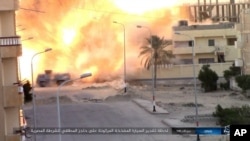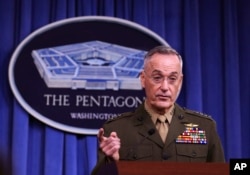As the embattled Islamic State terror group has lost much of its territory and strength in Syria and Iraq, governments in North Africa fear many returning fighters from the Mideast battlegrounds could trigger instability in the region.
"The region is threatened ... with the return of foreign fighters," Algeria Foreign Minister Abdul Qader Messahel told reporters in Cairo last week.
"The signs and reports indicate that the [foreign fighters'] return will be in our region," Messahel added.
Thousands of foreign fighters
Recent reports indicate at least 5,600 foreign fighters have left the battlefield following IS defeats in Syria and Iraq. Hundreds of fighters from North African states, including Tunisia and Morocco, have already returned to their home countries, according to a recent report by the Soufan Center, a New York-based think tank following the developments in the region.
North Africa has been a major source of foreign fighters for IS and other terror groups in Iraq and Syria, with thousands of fighters from the region having reportedly joined the conflict in the two troubled countries since 2012.
Analysts think that while some fighters might settle down and join the mainstream in their respective communities, others might move on to the next conflict after the one in the Middle East.
"Foreign fighters returning from ISIS is a very great concern in the West and in the Middle East and North Africa region," David Des Roches, an associate professor at the National Defense University in Washington, told VOA, using an acronym for the militant group.
"This group of radicalized people do not view themselves as defeated, but rather feel they are returning to carry on jihad on a different battlefield," Des Roches added.
Ongoing conflicts
There is also growing concern that the ongoing conflicts in several North African countries provide a fertile ground for the re-emergence of IS in the region.
In Egypt, several militant groups, including Ansar Beit al-Maqdis, which has pledged allegiance to IS, are controlling large swaths of the Sinai Peninsula, which borders the Gaza Strip and Israel, and have established their own rule over the areas under their control.
Ansar Beit al-Maqdis' local affiliates are posing a threat in the neighboring Sahel region of Africa. Last month, IS-linked militants killed four U.S. soldiers in Niger.
Libya is another location that analysts think IS might use as a breathing space and a hub from which to send fighters to neighboring countries in an effort to expand its sphere of influence.
Leaders in North African countries and analysts say the political and military crisis in Libya is providing a springboard for IS fighters moving to North Africa.
"There is every likelihood that squeezed IS fighters will seek to move to a more permissive security environment, and that would be Libya and the states of the Sahel," Jennifer Cooke, director of Africa Program at the Center for Strategic and International Studies in Washington, told VOA.
IS in Libya
Ismael Meraf, an Algerian analyst, told Alhurra, a U.S.-based public Arabic-language satellite TV channel that broadcasts to Middle East and North African audiences, that Libya "has become a fertile land for terrorist groups."
U.S. officials and lawmakers also have warned of IS's growing threat in Africa.
"The more we succeed on the Middle East, the more we are going to see the snakes run to Africa," U.S. Senator Thom Tillis of North Carolina said last month following a classified briefing on the attack on U.S. troops by an IS-affiliated group in Niger.
Senator John McCain of Arizona, chairman of the Senate Armed Services Committee, has warned that "there is no doubt" the fight against IS is now moving to Africa.
General Joseph Dunford, chairman of the U.S. Joint Chiefs of Staff, told lawmakers last month that IS aspires to establish a larger presence "from Libya to Egypt's Sinai to West Africa."
U.S. Africa Command spokeswoman Robyn Mack recently told VOA that the U.S military had launched new airstrikes against IS militants in Libya.
Mack said the strikes occurred November 17 and 19 near Fuqaha "in coordination with the Libyan Government of National Accord."
Several IS militants have been reportedly killed in the airstrikes.
"We are committed to maintaining pressure on the terror network and preventing them from establishing [a] safe haven," Mack said.
Battling IS presence
IS has a presence in Libya's coastal city of Sirte. The U.S and Libyan governments have been battling the terror group to try to prevent it from establishing a hub in the war-torn country.
The military carried out about 500 airstrikes last year against the IS fighters in Sirte.
Experts, however, charge that IS is looking to establish a hub not only in Libya but also in other vulnerable countries.
Des Roches, of the National Defense University, maintains that a comprehensive strategy is needed to counter the threats posed by the returning IS fighters in Africa and elsewhere.
Other than military measures, combating IS and other militant groups in the region requires addressing other factors that enable extremist groups to expand in the region, he added.
"There is a need to create more jobs, fight corruption, and provide services and better governance in Africa," Des Roches told VOA. "To win the ideological battle, the governments should focus on teaching moderate Islam."
VOA Pentagon correspondent Carla Babb contributed to this report.






